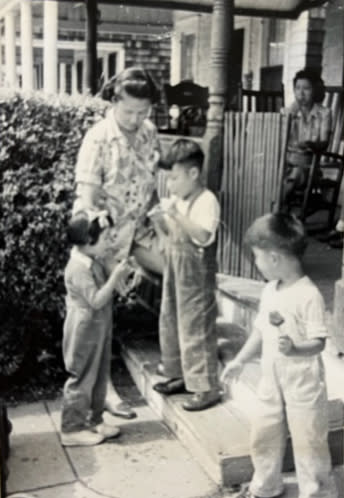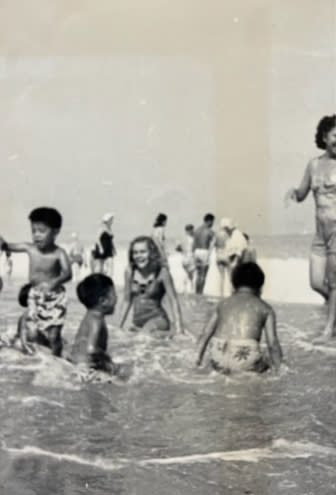‘Chinatown by the Sea’ celebrated as escape from tenement life for early NYC Chinese families
Every summer starting in the 1940s, David Liu's family would leave behind their Chinatown neighborhood in Manhattan for the sandy beaches of the Jersey Shore, indulging in hot dogs, burgers, ice cream and other American beach staples they’d rarely have at home. And they were far from the only Chinatown families with this tradition.
“Once you got to the beach, you would look for your friends and you would bring your beach towels and umbrellas and stick them together,” Liu, 77, remembers of those summer days. “And in a very Chinese style, everybody shares their food.”

The oceanfront community of Bradley Beach, New Jersey, formally recognized a stretch of its borough as “Chinatown by the Sea” last month, in honor of the dozens of Chinese Americans who looked to the area every summer as an unlikely escape from the city, starting in the 1920s.
While these families later bought up property, turning the area into a summer enclave of sorts, trips to the shore some 60 miles south of Manhattan initially began with the support of Church of All Nations and the nonprofit Fresh Air Fund. Together, they helped provide Chinatown families with a chance to flee the tenements and cramped conditions to take part in a quintessential American beach vacation.
Ava Chin, author of “Mott Street: A Chinese American Family’s Story of Exclusion and Homecoming,” said that Bradley Beach has remained a profoundly important part of Chinese American history, symbolizing a rare reprieve the community got from the racism and violence they contended with in their everyday lives.
“Pressure that the community is suffering really doesn’t get alleviated for them, especially for the moms and the kids, until they go to Bradley,” Chin, whose family also spent summers in the area, told NBC News.
For more from NBC Asian America, sign up for our weekly newsletter.Bradley Beach Mayor Larry Fox declared streets Newark Avenue and Cliff Avenue, a few blocks from the shore, as "Chinatown by the Sea" in a proclamation read during the enclave’s centennial celebration last month. But the community’s story began at one summer home owned by the Church of All Nations, a Manhattan-based Methodist settlement house, and the involvement of the Fresh Air Fund, an organization that continues to aim to send low-income groups to summer camp activities.
The church, Chin added, had a mission that catered to the Chinese community, particularly families who had just immigrated from the southern coastal region of China. The church eventually began inviting families to its house on Bradley Beach, “Cliff Villa,” which has since been torn down.
“The families come over and they’re living in these vertical villages and these apartment buildings. They’re all cooped up,” Chin said. “When the Church of All Nations started inviting Chinese constituents out to Bradley in the 1920s, it was this release valve.”
Chin compared Cliff Villa to a summer camp, where girls and boys were separated into dorms. Families enjoyed the outdoors and the space they didn’t have in the city. The experience was simultaneously very American, but also one that reminded them of home, Chin said.
“The Jersey Shore really offered Chinese Americans this opportunity to have a summer that was this incredible American experience. For some of them, it was the first time that they ate American food,” Chin said. “Because they were coastal … and they were used to fishing and being connected to nature, there was something so comforting about being able to do that.”

The open ocean air wasn’t the only draw to the summer getaway. The families at the time were attempting to put down roots in the shadow of the Chinese Exclusion Act, which had passed in 1882 and was not repealed until 1943. Chinatown was largely a bachelor society, with most working in manufacturing or in restaurants. Some merchants, however, amassed the funds to bring their wives and children over from China and navigate the exclusion laws, Chin said. But not only did families have to deal with racism and overwhelming anti-Chinese sentiment; those in Chinatown were also in the crossfire of the violent Tong wars, a series of Chinese American gang wars that tore through the neighborhood for decades.
“Authorities conflate the violence between the Tongs with the immigration laws and … what happens is there are raids happening in Chinatown, not just in stores, but in our buildings,” Chin said. “Anybody who was Chinese or Asian was subject to you know, just this deep suspicion who shouldn’t be here. They weren’t embraced.”
But many families felt safe in Bradley Beach with some, particularly those of the merchant class, feeling comfortable enough to purchase houses, Chin said. Liu’s grandmother, Lee Ng Shee, was among the first to buy a house there in the early 1940s, blazing a trail for others to move into the neighborhood, he said. His mother eventually bought a row of three homes across the street, where the family lived in one and rented out the other two. And his aunts also moved just down the way. Interactions with locals were always pleasant, Liu remembers.

“As kids, we would walk to Asbury Park, and ride our bikes through and they always looked upon us like these nice kids, well-behaved kids coming from Chinatown,” he said. “We were very, very much accepted.”
In the mornings, their little community would set out for their “daily ritual,” Liu, who visited every summer of his youth, said.
“Everybody would be walking to the ocean. So you would see everybody walking up Newark Avenue and everybody would be sitting on their porches and they could socialize and talk because people are walking back and forth to the beach,” he said.
Large groups of Chinese American families and friends would set up their beach umbrellas while the children would paddleboard, attempt to surf the waves and play ball, Liu said. Sometimes, they’d stage fake weddings or make up elaborate activities. And together, they’d enjoy deli sandwiches and share massive coolers of drinks and “junk food,” Liu recalled. While occasionally someone would bring some pork buns, the majority would leave the Chinese food back in Manhattan, along with the summer chaos, he said.
Reflecting on those lazy days he spent on the Jersey Shore, Liu said he feels “grateful,” adding that its significance has grown over time.
“We just didn’t really realize what we were leaving behind in Chinatown for other kids,” Liu said. “I look at it as a very privileged experience.”
This article was originally published on NBCNews.com
